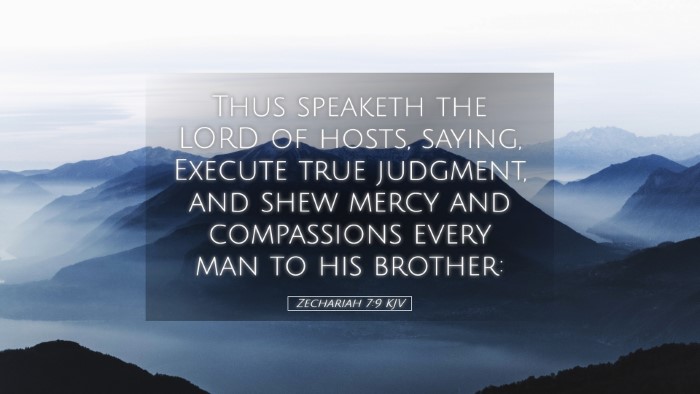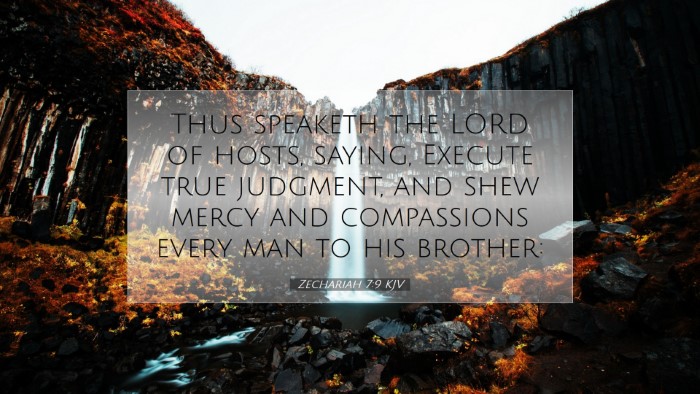Old Testament
Genesis Exodus Leviticus Numbers Deuteronomy Joshua Judges Ruth 1 Samuel 2 Samuel 1 Kings 2 Kings 1 Chronicles 2 Chronicles Ezra Nehemiah Esther Job Psalms Proverbs Ecclesiastes Song of Solomon Isaiah Jeremiah Lamentations Ezekiel Daniel Hosea Joel Amos Obadiah Jonah Micah Nahum Habakkuk Zephaniah Haggai Zechariah MalachiZechariah 7:9
Zechariah 7:9 KJV
Thus speaketh the LORD of hosts, saying, Execute true judgment, and shew mercy and compassions every man to his brother:
Zechariah 7:9 Bible Commentary
Commentary on Zechariah 7:9
Verse: Zechariah 7:9 (ESV) - "Thus says the LORD of hosts, Render true judgments, show kindness and mercy to one another."
Introduction
Zechariah 7:9 presents a clarion call for justice and mercy within the community of God's people. The verse is part of a larger discourse where God, through the prophet Zechariah, is urging His people to reflect on their behaviors and spiritual values after the Babylonian exile. This commentary synthesizes insights from several public domain sources to elucidate the rich meanings embedded in this verse, especially for pastors, students, theologians, and Bible scholars.
The Divine Mandate
Matthew Henry emphasizes that this verse underscores the character of God as one who demands both justice and compassion. Henry notes, "The primary call is for true judgments, which indicates the need for fairness in dealings, reflecting God's own character in the midst of His people." The justice spoken of here is not merely legal but is deeply relational, advocating for ethical conduct in all interactions.
Albert Barnes elaborates on the necessity of true judgments by stating, "The divine requirement is not limited to rituals or ceremonies; instead, it reaches deeper into the fabric of daily living among ourselves.” He encourages believers to consider the societal implications of this exhortation, highlighting that justice in community aligns with God's kingdom values.
Kindness and Mercy
The specifics of rendering kindness and mercy are critical. Adam Clarke comments, "The Hebrew terms used convey a sense of unfailing love and loyal kindness, which are not just emotional responses but are active commitments to the wellbeing of others." Clarke's analysis indicates that the call to show kindness involves tangible acts of love and support toward one another, reflecting God's nature of mercy.
This dual call of justice and mercy can be seen as a counterpoint to the rigid legalism that might have emerged post-exile. As Matthew Henry points out, "God is not pleased with sacrifices if there lacks the empathy and compassion that characterize true worship." This reinforces the concept that the heart of God's commandments is relational integrity.
Contextual Reflection
In the broader context of Zechariah, God is addressing the returned exiles who are struggling to reintegrate into a life of righteousness and community. The prophetic call is timely. Albert Barnes suggests, "Like Israel of old, modern believers can easily slip into a pattern of observance without the heart of God in their actions." This context adds weight to the divine imperative by reminding today's readers that such truths are timeless challenges.
The Application of the Verse
Applying Zechariah 7:9 requires introspection and a commitment to live out the principles of justice and mercy in contemporary settings. Adam Clarke urges, "It is not enough to understand these concepts; believers must actively seek to embody them, especially in a world marked by injustice and conflict." He encourages church leaders to foster environments where these values are continually taught and modeled.
- Justice: This can involve advocacy for the oppressed and marginalized in society. It aligns with the biblical call to defend the cause of the fatherless and widow.
- Kindness: This suggests a disposition of grace in everyday interactions, offering support and understanding to those struggling.
- Mercy: Practicing forgiveness and providing for those in need are critical expressions of this virtue, as seen throughout scripture.
Spiritual Significance
Ultimately, Zechariah 7:9 serves as a vital reminder that spiritual life is demonstrated through relational integrity. It begs the question of how faith translates into daily practices. Matthew Henry summarizes this well: "The condition of our worship and relationship with God is intrinsically tied to our treatment of others.” This is indeed a crucial tenet of both Old and New Testament ethics.
Conclusion
In conclusion, Zechariah 7:9 encapsulates the essence of covenant faithfulness, where justice and mercy converge. For pastors, students, theologians, and Bible scholars, this verse offers profound insights into the heart of God's law and the mandate for community living. We are called to implement these virtues in our lives so that we may reflect the character of God to the world around us.
Let us heed this divine instruction, ensuring that our practices of faith are not mere formality but are deeply rooted in the love and righteousness that God desires from His people.


